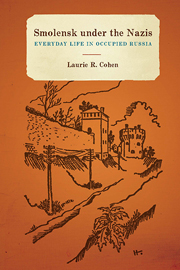Introduction
Published online by Cambridge University Press: 05 December 2013
Summary
Why War? Why Smolensk?
Why investigate anew the Second World War and the Soviet Union? Studies on this topic already take up countless rows in libraries, bookshelves, bookstores, and across a fair share of virtual spaces. Indeed, it is already some years since Mark Edele pronounced that the German-Soviet War—known in Soviet historiography as the Great Patriotic (or Fatherland) War—considered by many a record-breaking campaign of murder and destruction, had experienced a “renaissance among historians.” Investigations have ranged from its broad military dimensions to more economic and ideological aspects. Studies on the Holocaust in the territories of the former Soviet Union occupy a central place, such that it is hardly surprising that a reviewer of several scholarly works on this period would recently remark: “What do we now know about the Nazi occupation of Eastern Europe? A great deal—more, perhaps, than many of us can or wish to stomach.”
Nonetheless, our understanding of this devastating period is still fragmentary, as the latest studies continue to illustrate. One new direction has been comparative, represented by Timothy Snyder's Bloodlands (2010), which explores the shared German and Soviet regimes' mid-twentieth-century European killing fields, and Dieter Pohl's “Vernichtungskrieg” (war of extermination), which juxtaposes Nazi Germany's colonization of eastern Europe with imperial Japan's occupation of China. Another innovative turn has investigated acoustic memories of the war: representations, for instance, of sound by Russian eyewitnesses. Still others, such as Simone Bellezza's study of the occupied Dnepropetrovs'k region, examine the war at a microhistory level.
- Type
- Chapter
- Information
- Smolensk under the NazisEveryday Life in Occupied Russia, pp. 1 - 16Publisher: Boydell & BrewerPrint publication year: 2013



